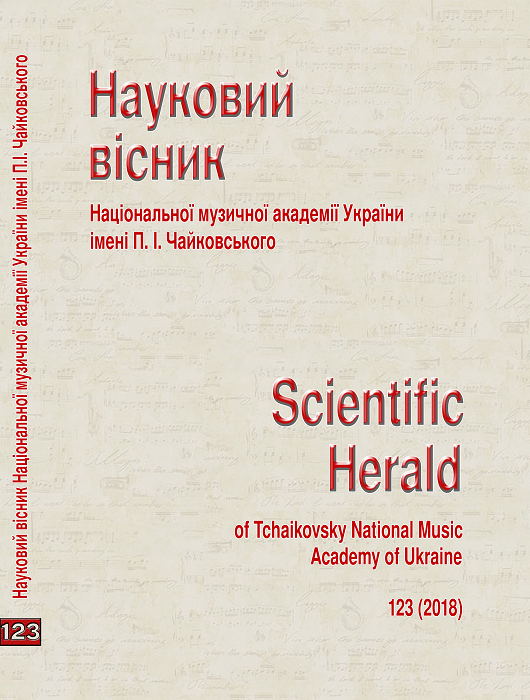Symphony for mixed chorus “Holy Week” by Sviatoslav Lunev: author’s interpretation of spiritual and musical traditions
DOI:
https://doi.org/10.31318/2522-4190.2018.123.152417Keywords:
genre, choral symphony, spiritual music, Holy Week, tradition, verbal text, musical textAbstract
Relevance of the study. In the XX-XXI centuries the structure of the spiritual choral genres, which over the years were presented as a strict and immutable canon, started to permit some transformations. In the Symphony "Holy Week" by Svyatoslav Lunev, the most high-demanded ideas in the field of contemporary composer searches were realized. One of the most significant is the implementation of the traditions of spiritual music through the prism of an individual creative view of the genre of choral symphony, which up to the present time does not have stable genre frames. The necessity of studying such trends and to analyze the specifics of the refraction of spiritual genre canons through the prism of symphonic thinking outlines the relevance of this study.
The paper objective. The purpose of the study is to reveal the peculiarities of the author’s interpretation of the spiritual and musical traditions in the Lunev’s Symphony "Holy Week".
Methodology of the study. Drawing on the analysis methods of the verbal and musical content of this work, the author’s draws parallels between the Lent services and parts of the symphony, revealing concentric features in the structure of the cycle and a peculiar simultaneous "nonlinear" vision of the spiritual singing atmosphere. Results and conclusions.
The results of the study are connected with synthesis of immanent characteristics of spiritual music and the genre and composition canvas of the symphony "Holy Week". This is a choral composition written within the framework of the most modern tendencies. The author’s vision allowed Lunev to raise the perennial themes of faith and spiritual pursuit. The composer does not restrict himself neither by the strict canons of spiritual genres, nor by the abstract conflictuality of the instrumental symphony. Lunev recreates the prayer-sound atmosphere of the liturgical songs connected with the idea of repentance, the time of Lent and the Holy Week. He flexibly refracts spiritual traditions through his own vision, shifting the emphasis to the deep content of the text and using the chorus as an instrument for transmitting verbalized thought. In the musical narrative there is a constant presence of the author: in emotional prayer calls "from the first person", in the intertwining of various texts of hymns and their contradistinction, in quotations and allusions of genuine spiritual tunes. This approach allows the composer to convey the state of the praying person, who subconsciously perceives the time in nonlinear dimension and only two realities coexist – the currently perceived sound picture of worship and his own thoughts existing beyond of this time.
References
Gulyanitskaya, N. S. (2002), Poetika muzyikalnoy kompozitsii: Teoreticheskie aspektyi russkoy duhovnoy muzyiki 20 veka. Moskva : Yazyiki slavyanskoy kulturyi. 432 p. [in Russian]
Moskalenko, V. G. (2013), Lektsii po muzyikalnoy interpretatsii: ucheb. posob. Kiev: TOV «TipografIya «Klyaksa». 272 p. [in Russian]
Nazaykinskiy, E. V. (2003), Stil i zhanr v muzyike : ucheb. posob. dlya stud. vyissh. ucheb. zavedeniy. Moskva: Gumanit. izd. tsentr VLADOS. 248 p. [in Russian]
Ryazantseva, L. D. (1994), O prelomlenii traditsiy starinnyih otechestvennyih horovyih zhanrov v russkoy muzyike 70–80 godov 20 veka : avtoref. dis. … kand. iskusstvovedeniya : 17.00.02/ Ros. akad. musyiki im. Gnesiniyh. Moskva. 17 p. [in Russian].
Trubin, N. G. (2004), Duhovnaya muzyika. Smolensk : Smolenskoe oblastnoe knizhnoe izdatelstvo «Smyadyin». 229 p. [in Russian].


